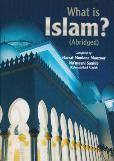What is Islam - eBook
This battle was the most decisive battle in the annals of Islam because this battle was the forerunner to the glory and might of Islam, and it marked the beginning of the downfall and humiliation of disbelief.
Through the divine mercy of Allah Ta‘ala, without any form of apparent means and material resources, the Deen of Islam was supported and assisted purely from the unseen, and such a powerful blow was given to the head of disbelief and polytheism that its skull splintered into pieces.
Hazrat Abdullah bin Jahsh (radhiyallahu ‘anhu) and his companions had taken Uthmaan bin Abdillah and Hakam bin Kaysaan as captives during their expedition. Thus, the Quraish sent a sum of money as ransom for the release of these two captives who were held by the Muslims.
A trade caravan of the Quraish was returning from Syria to Makkah Mukarramah on the last day of the sacred month of Rajab (in which engaging in battle and fighting was declared forbidden). However, mistakenly thinking that it was already the first of Sha’baan, the Sahaabah (radhiyallahu ‘anhum) launched an attack on this trade caravan of the Quraish.
The Sariyyah of Hazrat Abdullah bin Jahsh (radhiyallahu ‘anhu)
Written by user2After returning from the expedition of Safawaan, Rasulullah (sallallahu ‘alaihi wasallam) despatched Hazrat Abdullah bin Jahsh (radhiyallahu ‘anhu) towards a place called Nakhlah in the month of Rajab 2 A.H. Rasulullah (sallallahu ‘alaihi wasallam) also sent the following eleven Muhaajireen with him:
First Expedition of Badr - Also Referred to as the Expedition of Safawaan or the Minor Expedition of Badr
Written by user2Barely ten days had passed after Rasulullah’s (sallallahu ‘alaihi wasallam) return to Madinah Munawwarah from the battle of Ushayrah when Kurz bin Jaabir Fihri launched a late-night attack on the pastures of Madinah Munawwarah, and after stealing a number of camels and goats belonging to the people of Madinah Munawwarah, he fled.
During the month of Jumaadal Oola of the year 2 A.H., Rasulullah (sallallahu ‘alaihi wasallam) set out with two hundred Muhaajireen in the direction of Ushayrah to attack the caravan of the Quraish. Ushayrah is the name of a place close to Yambu’. Rasulullah (sallallahu ‘alaihi wasallam) appointed Hazrat Abu Salamah bin Abdil Asad (radhiyallahu ‘anhu) as his vicegerent over Madinah Munawwarah in his absence.
Through wahi (divine revelation), Rasulullah (sallallahu ‘alaihi wasallam) was informed of a trade caravan of the Quraish heading towards Makkah Mukarramah. Therefore, in the month of Rabee’-ul-Awwal or Rabee’-us-Saani in the year 2 A.H. Rasulullah (sallallahu ‘alaihi wasallam) set out in the direction of Bawaat with at least two hundred Mujaahideen. The purpose of this expedition was to launch an attack against this trade caravan.
Sariyyah of Hazrat Sa’d bin Abi Waqqaas (radhiyallahu ‘anhu) and the Expedition of Abwaa
Written by user2In the month of Zul-Qa’dah, during the first year of hijrah, Rasulullah (sallallahu ‘alaihi wasallam) despatched an infantry group (a group of foot-soldiers) comprising of twenty Muhaajireen under the command of Hazrat Sa’d bin Abi Waqqaas (radhiyallahu ‘anhu) to Kharraar.
This infantry group would hide during the day and travel at night. When they reached the valley of Kharraar, they learnt that the Qurayshi caravan (that they were pursuing) had already left. This group then returned to Madinah Munawwarah.
Sunnats and Aadaab of Business and Dealings – Part Eight
Written by user213. It is not permissible for one to get involved in interest bearing transactions. Giving and taking interest are both haraam in Islam.
وَأَحَلَّ اللهُ الْبَيْعَ وَحَرَّمَ الرِّبٰوا
And Allah has permitted trade and prohibited riba – interest. [1]
الَّذِيْنَ يَأْكُلُوْنَ الرِّبٰوا لَا يَقُومُوْنَ إِلَّا كَمَا يَقُوْمُ الَّذِيْ يَتَخَبَّطُهُ الشَّيْطٰنُ مِنَ الْمَسِّ
Those who consume interest will rise (on the Day of Qiyaamah) like the one who has been afflicted by the evil touch of Shaitaan. [2]
فَإِنْ لَّمْ تَفْعَلُوْا فَأْذَنُوْا بِحَرْبٍ مِّنَ اللهِ وَرَسُوْلِهِ
“If you do not do so (desist from dealing in interest) then be prepared to wage war against Allah and His Rasul (sallallahu ‘alaihi wasallam).” [3]
Sariyyah of Hazrat Ubaidah bin Haarith (radhiyallahu ‘anhu)
Written by user2Eight months after the Hijrah, during the month of Shawwaal in the first year of the hijrah, Rasulullah (sallallahu ‘alaihi wasallam) despatched a contingent of sixty or eighty Muhaajireen, mounted on conveyances, under the commandership of Hazrat Ubaidah bin Haarith (radhiyallahu ‘anhu) towards Raabigh. In this contingent, there were no Ansaari Sahaabah present.
When they reached Raabigh, they had a confrontation with two hundred Quraishi mounted cavalry. However, no actual fighting took place. Only Hazrat Sa’d bin Abi Waqqaas (radhiyallahu ‘anhu) launched a single arrow against the enemy. This was recorded as the first arrow to be fired in the history of Islam.







